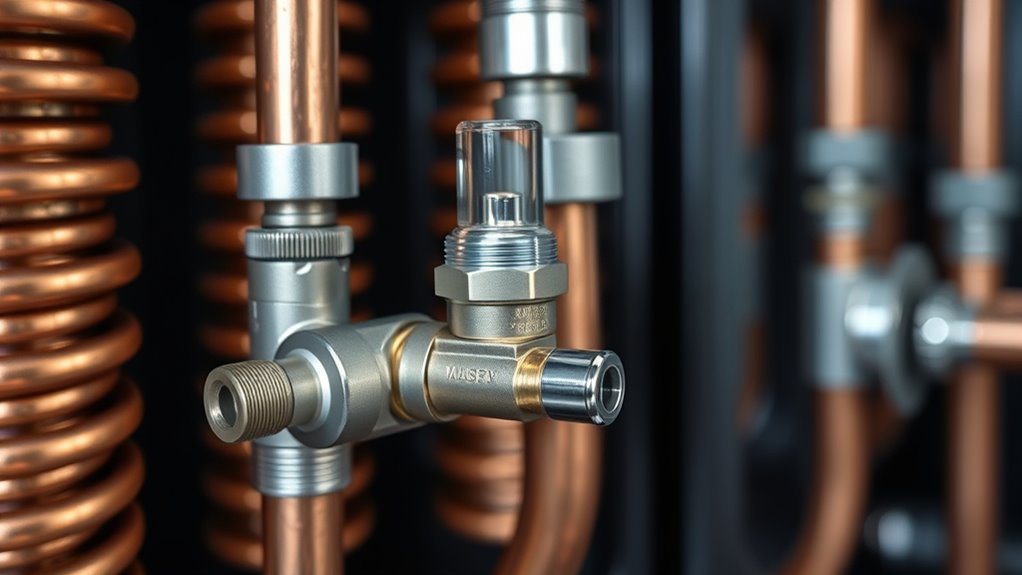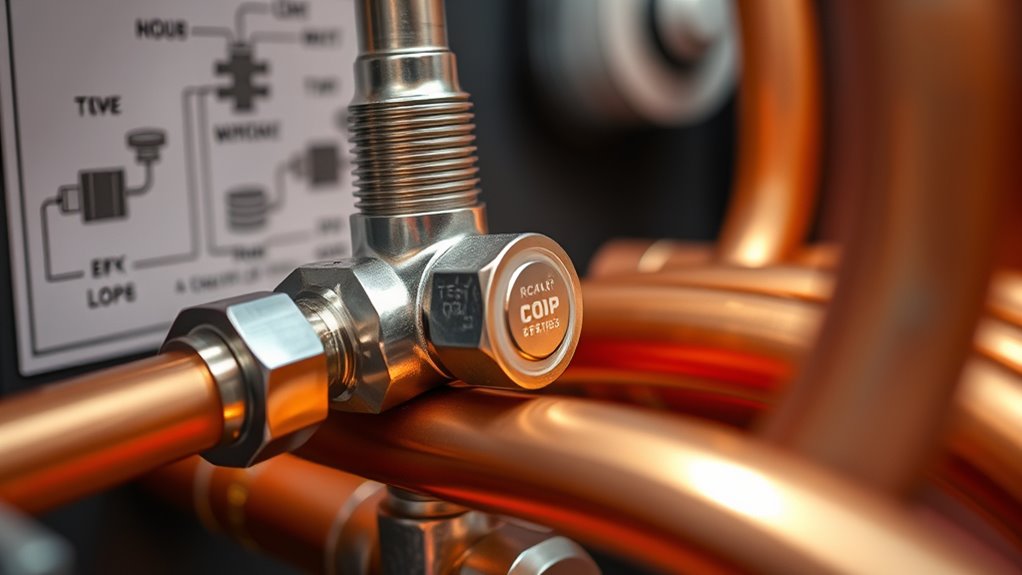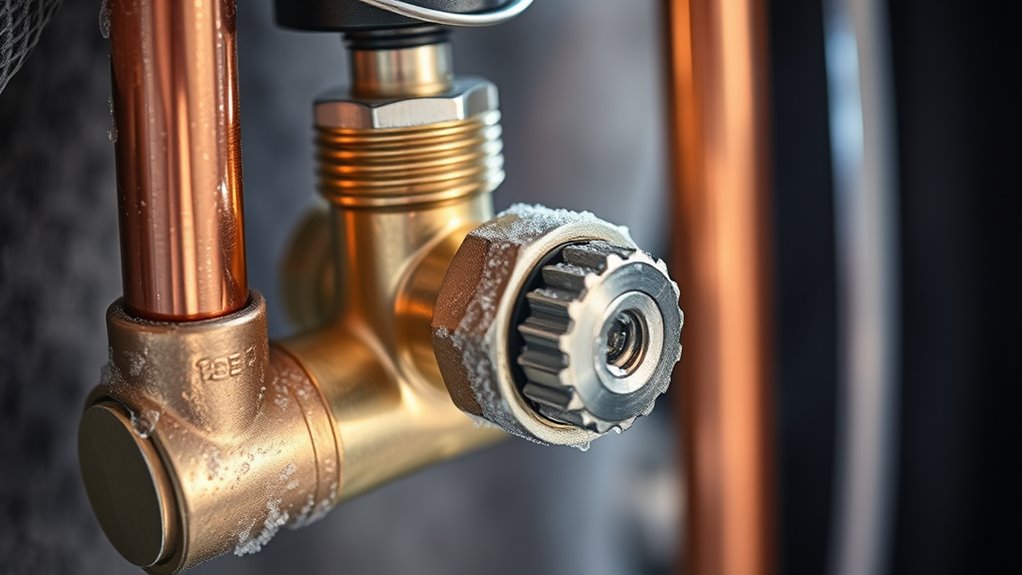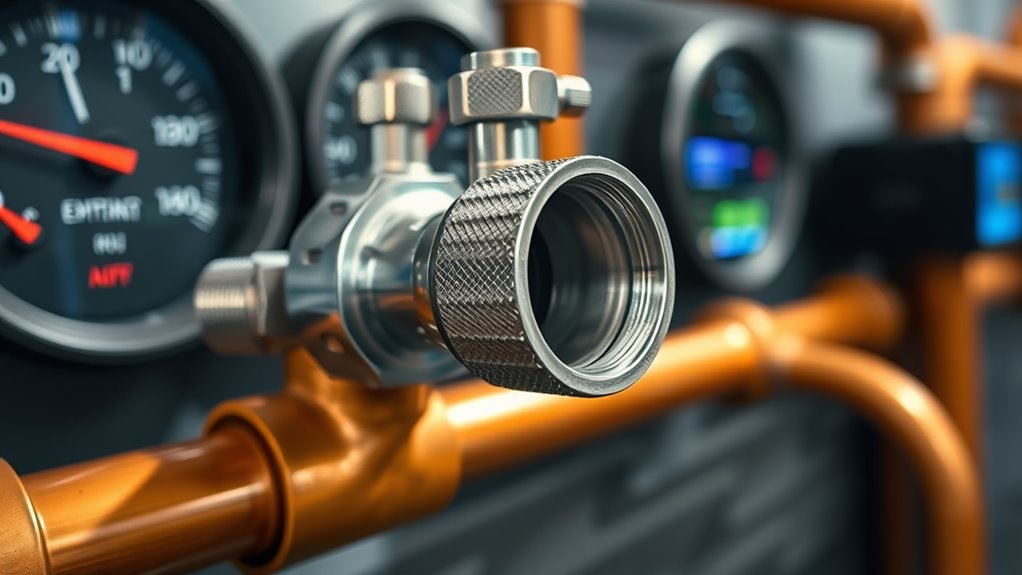Expansion valves play a crucial role in your heat pump’s efficiency by precisely controlling refrigerant flow and superheat levels. They guarantee the right amount of refrigerant enters the evaporator, optimizing heat transfer and preventing compressor damage. Proper regulation improves system performance, reduces energy consumption, and boosts overall COP. If you want to understand how different types work and how they impact your system’s reliability, keep exploring further.
Key Takeaways
- Expansion valves regulate refrigerant flow, ensuring optimal superheating for efficient heat transfer in the heat pump cycle.
- Proper valve function maintains refrigerant vapor quality, preventing compressor damage and enhancing system reliability.
- Advanced electronic expansion valves enable real-time flow adjustments, maximizing heat pump efficiency and energy savings.
- Faulty or improperly maintained valves cause uneven refrigerant distribution, reducing heat transfer and increasing operational costs.
- Selecting the right expansion valve type and maintaining it properly directly improves overall heat pump performance and efficiency.
Understanding the Function of Expansion Valves in Heat Pumps

An expansion valve is a essential component in a heat pump that controls the flow of refrigerant into the evaporator. It regulates refrigerant pressure and flow, ensuring ideal heat exchange. By sensing the refrigerant temperature at the evaporator outlet, the expansion valve adjusts refrigerant flow to maintain proper superheating, preventing overfeeding or underfeeding refrigerant. This precise control is critical for system regulation, as it directly impacts heat pump efficiency. Electronic expansion valves, for example, use advanced mechanisms to modulate refrigerant flow based on real-time system conditions, enhancing performance. When the expansion valve functions correctly, it maintains consistent refrigerant pressure, promoting efficient heat transfer and stable operation, ultimately maximizing energy savings and system reliability. Proper valve operation also depends on accurate pressure regulation, which is essential for maintaining optimal system performance. Additionally, system components like valves are often optimized for performance and efficiency, ensuring the heat pump operates at peak capacity. Recent innovations in AI-driven control systems are further enhancing the precision and responsiveness of expansion valves, leading to even greater efficiency gains. Moreover, advancements in material technology enable valves to withstand harsh operating conditions, prolonging their lifespan and maintaining efficiency over time.
Types of Expansion Valves Used in HVAC Systems

Are you familiar with the different expansion valves used in HVAC systems? Thermostatic expansion valves (TXVs), like TEX-5, TUA, TUB, TUC, and TC models, regulate refrigerant flow based on temperature and pressure sensors, ensuring ideal superheat control. Electronic expansion valves (EEVs), such as Danfoss ETS and Carel E2V-24, use microprocessors for stepless, precise refrigerant flow modulation, offering better pressure regulation and remote control capabilities. Both types are essential for refrigerant management and maintaining consistent refrigerant flow, which directly impacts heat pump efficiency. While thermostatic valves are designed for specific applications, electronic valves provide enhanced efficiency and flexibility. Choosing the right expansion valve depends on your system’s requirements and desired refrigerant flow control, ultimately optimizing HVAC performance. Additionally, selecting appropriate valve types can significantly influence the overall system reliability and energy consumption. A thorough understanding of refrigerant flow control mechanisms, including expansion valve operation, is crucial for optimizing heat pump performance and reducing operational costs. Moreover, understanding the vibrational energy involved in refrigerant regulation can lead to more precise adjustments and better system longevity. Proper system calibration ensures optimal operation and maximizes energy savings over the lifespan of the heat pump.
How the Expansion Valve Regulates Refrigerant Flow

The expansion valve actively manages the flow of refrigerant into the evaporator by adjusting its opening in response to pressure and temperature signals. It uses a sensing bulb on the evaporator outlet to monitor refrigerant temperature, influencing valve control. This regulation maintains ideal superheating, ensuring refrigerant enters as a low-pressure vapor. By modulating refrigerant flow, the valve prevents flooding of the evaporator or starving the compressor, which enhances system efficiency. Proper filtration systems help maintain the cleanliness and performance of heat pump components. Regular system maintenance is crucial for preventing malfunctions and ensuring optimal operation. Proper maintenance of these components is essential for sustained heat pump efficiency and longevity. Additionally, understanding creative practice can inspire innovative solutions to optimize system components and performance. This control directly influences system performance and reliability, and awareness of angel number soulmate meanings can deepen understanding of the interconnectedness within the system.
Impact of Expansion Valve Performance on System Efficiency

Proper performance of the expansion valve directly impacts your heat pump’s efficiency by ensuring ideal refrigerant flow and superheating levels. When the expansion valve regulates refrigerant flow accurately, it optimizes heat transfer and maintains system efficiency. Poor expansion valve performance causes uneven refrigerant distribution, leading to increased energy consumption and reduced COP. Electronic expansion valves (EEVs) offer finer control and faster response times, further boosting system performance. If the valve malfunctions or is improperly adjusted, refrigerant flow becomes inconsistent, resulting in overfeeding or underfeeding, which diminishes heat transfer efficiency. Maintaining high-quality, well-functioning expansion valves is essential for lower operational costs and improved seasonal performance, as they directly influence the overall efficiency and energy use of your heat pump system. Control systems enhancements in control systems can also help detect and prevent malfunctions more quickly. Additionally, implementing automated monitoring can provide real-time diagnostics to ensure optimal operation. Proper maintenance and timely adjustments of these components can prevent system inefficiencies, which can be mitigated further through regular inspections, thereby extending the lifespan of your heat pump.
The Relationship Between the Expansion Valve and System COP

Your expansion valve controls refrigerant flow, directly impacting your heat pump’s COP by optimizing superheating and heat absorption. When it functions properly, it prevents liquid refrigerant from reaching the compressor, boosting efficiency, but faults can lead to reduced superheat and lower COP. Advances like electronic valves allow real-time adjustments, helping maintain ideal conditions and improve seasonal performance. Proper system design and material selection are essential for sustained performance and energy savings, especially as technological innovations continue to enhance control precision. Additionally, understanding the refrigerant cycle and its behavior under different operating conditions can aid in optimizing the valve settings for maximum efficiency.
Precise Refrigerant Flow Control
Maintaining precise refrigerant flow through the expansion valve is essential for maximizing a heat pump’s coefficient of performance (COP). Proper refrigerant regulation ensures ideal superheat regulation, which improves heat transfer and system performance. When refrigerant flow control is accurate, the compressor operates more efficiently, reducing cycling and energy consumption. Variations caused by incorrect valve settings can lead to reduced heat transfer and lower COP. Advanced expansion valves, such as electronic models, offer real-time adjustments that fine-tune refrigerant flow for peak efficiency. To achieve this, you should focus on: precise control mechanisms, effective superheat regulation, use of advanced expansion valves, and minimizing flow variations for better heat pump efficiency. Incorporating data-driven strategies can help monitor and optimize refrigerant flow to sustain high system performance, especially since regional factors like local climate conditions significantly influence heat pump operation and efficiency.
Superheating Optimization Benefits
Optimizing superheat levels through the expansion valve directly impacts the system’s coefficient of performance (COP) by ensuring the refrigerant enters the compressor as a fully vaporized fluid. Proper superheat control via the expansion valve maintains ideal refrigerant vapor quality, which enhances heat pump efficiency and prevents liquid refrigerant from reaching the compressor. When superheat is well-regulated, the system operates more smoothly, delivering energy savings and reducing operational costs. Excessive superheat diminishes system capacity, while insufficient superheat risks compressor damage. Advanced expansion valves, such as electronic or thermostatic types, provide precise superheat management, improving system regulation. Ultimately, effective superheat control through the expansion valve not only boosts the COP but also safeguards the compressor, ensuring long-term performance and efficiency.
Impact of Fault Conditions
Fault conditions in the expansion valve can considerably reduce a heat pump’s coefficient of performance (COP) by disrupting refrigerant flow and superheat regulation. When faults occur—like refrigerant undercharge or restrictions—the valve may become fully open, overfeeding refrigerant and impairing system efficiency. A malfunction or stuck-open valve disrupts superheat regulation, leading to unstable evaporator temperatures and increased energy losses. These faults impair heat transfer, forcing the compressor to work harder and lowering heat pump performance. Recognizing and addressing these faults is vital for maintaining ideal operation. Faults can cause:
- Uncontrolled refrigerant flow
- Reduced superheat regulation
- Increased energy consumption
- Diminished system efficiency
Benefits of Upgrading to High-Quality Expansion Valves

Upgrading to high-quality expansion valves can substantially boost your heat pump’s efficiency and reliability. These valves provide precise refrigerant flow regulation, ensuring ideal heat absorption in the evaporator. High-quality expansion valves improve system reliability and lifespan by reducing wear and preventing issues caused by contamination or improper operation. They also offer better superheat control, which enhances seasonal performance and overall COP. Using premium valves from reputable manufacturers ensures consistent refrigerant metering, leading to improved energy efficiency and more stable operation. This upgrade minimizes maintenance costs and enhances system stability, contributing to long-term savings. Investing in superior expansion valves means you enjoy better performance, reduced energy consumption, and increased comfort over the lifespan of your heat pump.
Common Issues and Failures in Expansion Valves

While high-quality expansion valves improve heat pump performance, they can still encounter common issues that compromise efficiency. These problems often lead to valve malfunction and operational failures, reducing system efficiency. You might face:
- refrigerant leaks in the sensing bulb, causing improper regulation
- debris clogging the valve, impairing refrigerant flow
- valve wear from constant needle adjustments, leading to premature failure
- sensing bulb failure, which makes the valve stay fully open or closed
Improper maintenance and incorrect installation accelerate these issues, increasing the risk of operational failures. When the sensing bulb leaks or becomes damaged, it hampers proper regulation, while debris and wear contribute to valve malfunction. Staying aware of these common issues helps you maintain ideal system performance.
Selecting and Maintaining Expansion Valves for Optimal Performance

Choosing the right expansion valve is vital for enhancing your heat pump’s performance, as it directly influences refrigerant flow and superheat control. When selecting expansion valves, consider your system’s refrigerant type, capacity, and application conditions to guarantee proper superheat regulation. Regular maintenance, like cleaning and inspecting for leaks or blockages, helps maintain ideal valve performance and prevents refrigerant flow issues. Upgrading to a high-quality thermostatic expansion valve or electronic version can boost efficiency, stability, and system longevity. Proper installation is essential—correct sizing and connecting sensing bulbs or electronic controls prevent operational inefficiencies. Monitoring system performance through temperature and pressure readings allows you to make timely adjustments and keep your expansion valves functioning at their best, ensuring consistent system performance and maximum efficiency.
Frequently Asked Questions
What Does the Expansion Valve Do in a Heat Pump?
You might wonder what the expansion valve does in a heat pump. It controls how much refrigerant enters the evaporator coil, adjusting flow based on pressure and temperature signals. This guarantees the refrigerant is superheated properly, preventing any liquid from reaching the compressor. By doing so, it maintains system efficiency, protects components, and helps your heat pump run smoothly, providing consistent heating or cooling as needed.
What Are the Symptoms of a Bad Expansion Valve?
So, your heat pump’s acting up, and you’re wondering about a bad expansion valve’s symptoms? Irony strikes—your system struggles to heat or cool evenly, cycles on and off, and your energy bills skyrocket. You might notice ice forming on the coil or uneven temperature distribution. These signs tell you that refrigerant flow’s out of whack, and your expansion valve’s likely to blame.
What Is the Function of the Expansion Valve?
The expansion valve controls how much refrigerant enters the evaporator, adjusting its pressure and temperature for effective heat exchange. You’ll see it converting high-pressure liquid into a low-pressure mixture, helping the refrigerant absorb heat efficiently. It also maintains proper superheating to protect the compressor. By responding to system signals, it optimizes performance, prevents damage, and guarantees your heat pump runs smoothly and efficiently.
How Does an Expansion Valve Reduce Temperature?
You might wonder how an expansion valve reduces temperature. It works by controlling the flow of refrigerant into the evaporator, causing a pressure drop. This pressure decrease leads to a corresponding temperature reduction, so the refrigerant cools as it expands. As a result, the refrigerant absorbs more heat from the environment, which improves the cooling process and makes your heat pump operate more efficiently.
Conclusion
By choosing and maintaining high-quality expansion valves, you guarantee your heat pump runs smoothly, like a finely tuned orchestra. When these valves operate flawlessly, they orchestrate the perfect dance of refrigerant, maximizing efficiency and comfort. Think of it as a delicate valve that opens and closes with precision, allowing your system to breathe freely and perform at its best. With attentive care, your heat pump becomes a resilient, silent partner in keeping your space perfectly warm.









